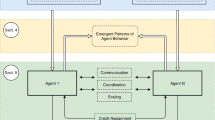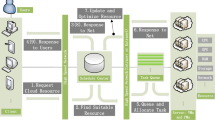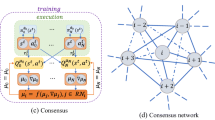Abstract
In edge-enabled Internet of Things (IoT), Quality of Experience (QoE)-guaranteed offloading decision is to decide which IoT tasks can be offloaded to edge servers with QoE guarantee. Centralized QoE-guaranteed offloading decision methods construct a global decision model for all IoT tasks with complete information. However, centralized offloading decision methods entail collecting global information from IoT devices, edge servers, and network environment, which may not be practical in large-scale distributed edge-enabled IoT environments, and it is unrealistic for privacy-critical and heterogeneous IoT tasks in many real-world edge-enabled IoT systems, where IoT devices may refuse to expose their private information and heterogeneous IoT tasks may have different QoE requirements, these issues make the application of centralized offloading decision method limited. To address these limitations, we propose a distributed offloading decision method which enables each IoT device to make decisions by partially observable global information in a decentralized manner. The distributed offloading decision process is modeled as a multi-agent partially observable Markov decision process, and a novel model-free deep reinforcement learning-based distributed algorithm named GRU Fictitious Self-Play Dueling Double Deep Recurrent Q Network(GFSP-D3RQN) is introduced to solve the problem. Furthermore, we measure the QoE of each IoT device based on a combination of latency and energy consumption, which are weighted differently according to the individual preferences of each IoT device, using a non-dimensionalized adjustment to accommodate the varying requirements of these IoT devices. Extensive simulation results show that our algorithm can achieve a higher average QoE and higher success ratio compared with baseline algorithms, which improved by at least 6.38\(\%\) and 5.91\(\%\), respectively.









Similar content being viewed by others
Data availibility
The data used in this paper can be obtained by numerical simulation through the experimental design in this paper.
References
Hong S-T, Kim H (2019) QoE-aware computation offloading to capture energy-latency-pricing tradeoff in mobile clouds. IEEE Trans Mob Comput 18(9):2174–2189
Meng Q, Wang K, Liu B, Miyazaki T, He X (2018) QoE-based big data analysis with deep learning in pervasive edge environment. In: Proceedings of the IEEE International Conference on Communications (ICC), Kansas City, MO, USA, Jul. , pp 1–6
Yuyi Mao et al (2017) A survey on mobile edge computing: the communication perspective. IEEE Commun Surv Tutor 19(4):2322–2358
Li X, Sun C, Wen J et al (2022) Multi-user QoE enhancement: federated multi-agent reinforcement learning for cooperative edge intelligence. IEEE Netw 36(5):144–151
Jiang H, Dai X, Xiao Z, Iyengar AK (2022) Joint task offloading and resource allocation for energy-constrained mobile edge computing. IEEE Trans Mob Comput. https://doi.org/10.1109/TMC.2022.3150432
Miao Hu et al (2020) Heterogeneous edge offloading with incomplete information: a minority game approach. IEEE Trans Parallel Distrib Syst 31(9):2139–2154
Alqerm I, Pan J (2021) DeepEdge: a new QoE-based resource allocation framework using deep reinforcement learning for future heterogeneous edge-IoT applications. IEEE Trans Netw Serv Manage 18(4):3942–3954. https://doi.org/10.1109/TNSM.2021.3123959
Jungyeon Baek, Kaddoum Georges (2021) Online partial offloading and task scheduling in SDN-Fog networks with deep recurrent reinforcement learning. IEEE Internet Things J. https://doi.org/10.1109/JIOT.2021.3130474
Baek J, Kaddoum G (2021) Heterogeneous task offloading and resource allocations via deep recurrent reinforcement learning in partial observable multifog networks. IEEE Internet Things J 8(2):1041–1056. https://doi.org/10.1109/JIOT.2020.3009540
Huo Y, Meng C, Li R, Jing T (2020) An overview of privacy preserving schemes for industrial Internet of Things. China Commun 17(10):1–18
Zeng Y , Huang Y , Liu J et al (2020) Privacy-preserving distributed edge caching for mobile data offloading in 5G networks. In: IEEE 40th International conference on distributed computing systems. IEEE
Jošilo S, Dán G (2019) Decentralized algorithm for randomized task allocation in fog computing systems. IEEE/ACM Trans Netw 27(1):85–97. https://doi.org/10.1109/TNET.2018.2880874
Chen Y, Zhao J, Wu Y et al (2022) Qoe-aware decentralized task offloading and resource allocation for end-edge-cloud systems: a game-theoretical approach. IEEE Trans Mob Comput. https://doi.org/10.1109/TMC.2022.3223119
Chen Y, Zhang S, Xiao M, Qian Z, Wu J, Lu S (2020) Multi-user edge-assisted video analytics task offloading game based on deep reinforcement learning. In: 2020 IEEE 26th international conference on parallel and distributed systems, ICPADS
Chen Z, Wang X (2020) Decentralized computation offloading for multi-user mobile edge computing: a deep reinforcement learning approach. EURASIPJ Wirel Commun Network 2020(1):1–21
Wu Y-C, Dinh TQ, Fu Y, Lin C, Quek TQS (2021) A hybrid DQN and optimization approach for strategy and resource allocation in MEC networks. IEEE Trans Wirel Commun 20(7):4282–4295. https://doi.org/10.1109/TWC.2021.3057882
Afrin M, Jin J, Rahman A, Rahman A, Wan J, Hossain E (2021) Resource allocation and service provisioning in multi-agent cloud robotics: a comprehensive survey. IEEE Commun Surv Tutor Secondquarter 23(2):842–870. https://doi.org/10.1109/COMST.2021.3061435
Wang J (2022) Edge artificial intelligence-based affinity task offloading under resource adjustment in a 5G network. Appl Intell 52:8167–8188
Papoudakis G, Christianos F, Rahman A Albrecht SV (2019) Dealing with non-stationarity in multi-agent deep reinforcement learning. arXiv:1906.04737 [cs, stat]
Kumar RR, Varakantham P (2020) On solving cooperative MARL problems with a few good experiences. arXiv:2001.07993 [Cs]
Heess N, Hunt JJ, Lillicrap TP Silver D (2015) Memory-based control with recurrent neural networks. arXiv preprint arXiv:1512.04455
Guo C, Liang L, Li GY (2019) Resource allocation for high-reliability low-latency vehicular communications with packet retransmission. IEEE Trans Veh Technol 68(7):6219–6230
Guo Hongzhi, Liu Jiajia (2018) Collaborative computation offloading for multiaccess edge computing over fiber-wireless networks. IEEE Trans Veh Technol 67(5):4514–4526
Haodong Lu et al (2020) Edge QoE: computation offloading with deep reinforcement learning for Internet of Things. IEEE Internet Things J 7(10):9255–9265
Alexey Rudenko et al (1998) Saving portable computer battery power through remote process execution. ACM SIGMOBILE Mob Comput Commun Rev 2(1):19–26
Xu Jie, Chen Lixing, Ren Shaolei (2017) Online learning for offloading and autoscaling in energy harvesting mobile edge computing. IEEE Trans Cognit Commun Netw 3(3):361–373
Pepper (2019) Robert: Cisco visual networking index (VNI) global mobile data traffic forecast update. In: Cisco, Tech. Rep., Feb. 2013. Accessed Jul 10
Chen S, Tang B, Wang K (2022) Twin delayed deep deterministic policy gradient-based intelligent computation offloading for IoT. Digit Commun Netw. https://doi.org/10.1016/j.dcan.2022.06.008
Wang P, Di B, Song L, Jennings NR (2022) Multi-layer computation offloading in distributed heterogeneous mobile edge computing networks. IEEE Trans Cognit Commun Netw 8(2):1301–1315. https://doi.org/10.1109/TCCN.2022.3161955
Peng K, Huang H, Bilal M et al (2022) Distributed incentives for intelligent offloading and resource allocation in digital twin driven smart industry. IEEE Trans Ind Inform. https://doi.org/10.1109/TII.2022.3184070
Pham XQ, Huynh-The T, Huh EN et al (2022) Partial computation offloading in parked vehicle-assisted multi-access edge computing: a game-theoretic approach. IEEE Trans Veh Technol 71(9):10220–10225
Zhou J, Tian D, Sheng Z, Duan X, Shen X (2021) Distributed task offloading optimization with queueing dynamics in multiagent mobile-edge computing networks. IEEE Internet Things J 8(15):12311–12328. https://doi.org/10.1109/JIOT.2021.3063509
Lu H et al (2020) Optimization of task offloading strategy for mobile edge computing based on multi-agent deep reinforcement learning. IEEE Access 8:202573–202584
Cao Z, Zhou P, Li R, Huang S, Wu D (2020) Multiagent deep reinforcement learning for joint multichannel access and task offloading of mobile-edge computing in industry 4.0. IEEE Internet Things J 7(7):6201–6213. https://doi.org/10.1109/JIOT.2020.2968951
Chen S, Chen J, Miao Y, Wang Q, Zhao C (2022) Deep reinforcement learning-based cloud-edge collaborative mobile computation offloading in industrial networks. IEEE Trans Signal Inf Process Netw 8:364–375. https://doi.org/10.1109/TSIPN.2022.3171336
Ming Tang, Wong Vincent WS (2020) Deep reinforcement learning for task offloading in mobile edge computing systems. IEEE Trans Mobile Comput. https://doi.org/10.1109/TMC.2020.3036871
Zhan Y, Guo S, Li P, Zhang J (2020) A deep reinforcement learning based offloading game in edge computing. IEEE Trans Comput 69(6):883–893. https://doi.org/10.1109/TC.2020.2969148
Huang J, Wang M, Wu Y, Chen Y, Shen X (2022) Distributed offloading in overlapping areas of mobile edge computing for Internet of Things. IEEE Internet Things J. https://doi.org/10.1109/JIOT.2022.3143539
Liu Jk, Mao Y, Zhang J, Letaief KB (2016) Delay-optimal computation task scheduling for mobile-edge computing systems. In: IEEE international symposium on information theory (ISIT), pp 1451–1455. https://doi.org/10.1109/ISIT.2016.7541539.
Rappaport TS (1996) Wireless communications: principles and practice, vol 2. Prentice Hall PTR, New Jersey
Zou J, Hao T, Yu C, Jin H (2021) A3C-DO: a regional resource scheduling framework based on deep reinforcement learning in edge scenario. IEEE Trans Comput 70(2):228–239
Nguyen DC et al (2021) Deep reinforcement learning for collaborative offloading in heterogeneous edge networks. In: IEEE/ACM 21st International symposium on cluster, cloud and internet computing (CCGrid). IEEE
Miettinen Antti P, Nurminen Jukka K (2010) Energy efficiency of mobile clients in cloud computing. HotCloud 10(4–4):19
Heinrich J, Silver D (2016) Deep reinforcement learning from self-play in imperfect-information games. arXiv preprint arXiv:1603.01121
Heinrich J, Lanctot M, Silver D (2015) Fictitious self-play in extensive-form games. In: Proceedings of the 32nd international conference on machine learning
Kawamura K, Mizukami N, Tsuruoka Y (2018) Neural fictitious self-play in imperfect information games with many players. In: Computer games, communications in computer and information science
Tampuu A et al (2017) Multiagent cooperation and competition with deep reinforcement learning. PloS One 12(4):e0172395
Wang Z et al (2016) Dueling network architectures for deep reinforcement learning. In: International conference on machine learning. PMLR
Van Hasselt H, Guez A, Silver D (2016) Deep reinforcement learning with double q-learning. In: Proceedings of the AAAI conference on artificial intelligence 30(1)
Hausknecht M, Stone P (2015) Deep recurrent q-learning for partially observable mdps. In: 2015 AAAI fall symposium series
Kapturowski S et al (2018) Recurrent experience replay in distributed reinforcement learning. In: International conference on learning representations
Yang Y, Wang J (2020) An overview of multi-agent reinforcement learning from game theoretical perspective. arXiv preprint arXiv:2011.00583
Liu L, Li H, Gruteser M (2019) Edge assisted real-time object detection for mobile augmented reality. In: Proceedings of the 25th annual international conference on mobile computing networking, pp 1–16
Wang W et al (2017) Gated self-matching networks for reading comprehension and question answering. In: Proceedings of the 55th annual meeting of the association for computational Linguistics, vol 1. Long Papers
Zhang L, Jabbari B, Ansari N (2022) Deep reinforcement learning driven UAV-assisted edge computing. IEEE Internet Things J 9(24):25449–25459. https://doi.org/10.1109/JIOT.2022.3196842
Acknowledgements
This work was supported in part by National Key Research and Development Project under Grant 2019YFB1706101; in part by the Science-Technology Foundation of Chongqing, China under Grant cstc2019jscx-mbdxX0047; in part by the Fundamental Research Funds for the Central Universities under Grant 2020CDCGRJ50.
Author information
Authors and Affiliations
Corresponding author
Ethics declarations
Conflict of interest
The authors have no relevant financial or non-financial interests to disclose.
Additional information
Publisher's Note
Springer Nature remains neutral with regard to jurisdictional claims in published maps and institutional affiliations.
Rights and permissions
Springer Nature or its licensor (e.g. a society or other partner) holds exclusive rights to this article under a publishing agreement with the author(s) or other rightsholder(s); author self-archiving of the accepted manuscript version of this article is solely governed by the terms of such publishing agreement and applicable law.
About this article
Cite this article
Hou, J., Wu, Y., Cai, J. et al. Qoe-guaranteed distributed offloading decision via partially observable deep reinforcement learning for edge-enabled Internet of Things. Neural Comput & Applic 35, 21603–21619 (2023). https://doi.org/10.1007/s00521-023-08905-2
Received:
Accepted:
Published:
Issue Date:
DOI: https://doi.org/10.1007/s00521-023-08905-2




